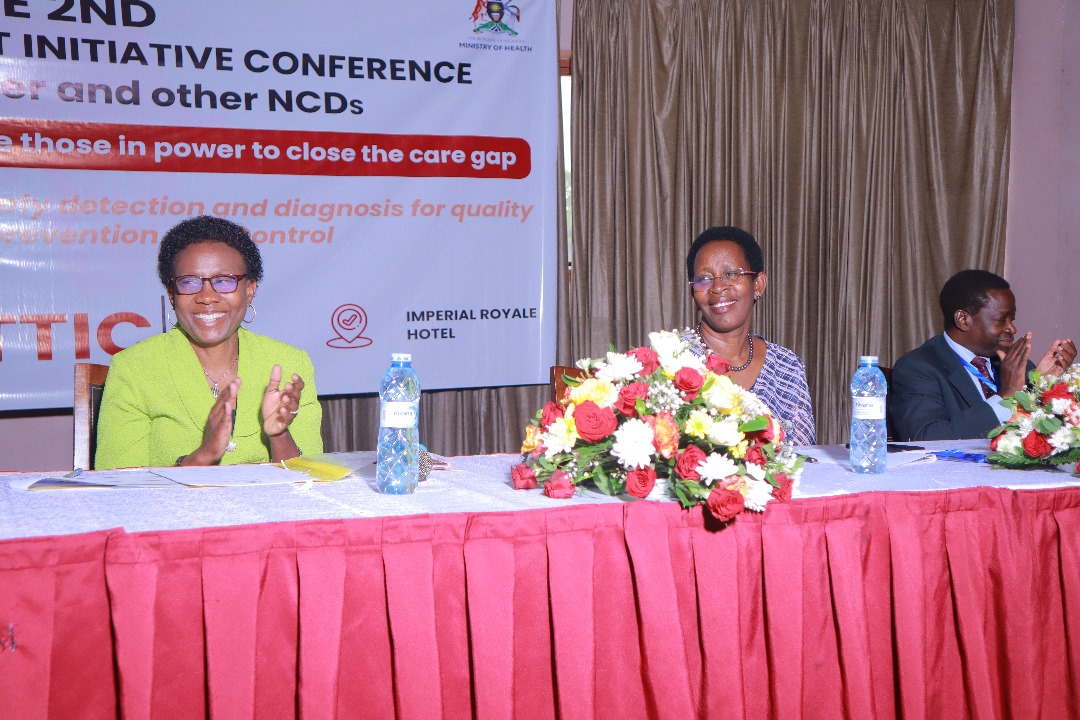Conquering Cancer in Uganda: Call for Citizen Action

Source: Ministry of Health, Republic of Uganda
By Komugisa Shalom and Oyera Annabel.
Kampala – 1st February 2024- In a bold move to curb the rising tide of Cancer and other Non-Communicable Diseases (NCDs), the Ministry of Health (MOH) and partners organized the 2nd Africa Test and Treat Initiative (ATTI). The event held at Imperial Royale Hotel in Kampala was aimed at improving early screening and diagnosis of Cancer and lifestyle diseases.
Addressing the gathering, Dr. Jane Ruth Aceng, the Minister of Health and Chief guest at the conference, emphasized that Cancer stands as one of the greatest challenges in the history of mankind and is currently the second-highest cause of death worldwide.
She issued a call to action while citing data from the World Health Organization (WHO), and revealed that a staggering 50% of cancers are preventable through lifestyle changes, such as avoiding cigarettes, limiting alcohol intake, adopting physical activities, and making healthier dietary choices. She went ahead to urge the citizens to recognize their power in shaping their health.
“We have the power in our hands to make lifestyle decisions for prevention of Cancer and other Non-Communicable Diseases,” said Dr Aceng.
Expressing concern over the alarming projections, Dr. Aceng noted that according to experts, by 2030, the burden of cancer in Africa is expected to double. In Uganda, 50% of all cancer cases contribute to the 70% global cancer deaths reported in lower- and middle-income countries.
A significant challenge is the late presentation of over 80% of cases to health facilities, leading to lower chances of survival.
Dr Aceng, also outlined the ministry’s plans and current initiatives to combat cancer and NCDs, including free Human Papilloma Virus (HPV) vaccination for all from Health Center III upwards, strengthening laboratory services for cancer screening and other NCDs at all levels, fortifying the Uganda Cancer Institute (UCI) and Uganda Heart Institute (UHI)with health centers across all regions, promoting the National Day of Physical Activities in June, and advocating for mandatory screening of prostate cancer and free screening for cervical cancer in women.
Furthermore, the Ministry of Health, Permanent Secretary, Dr. Diana Atwine highlighted various cancer categories such as; pProstate Cancer, Breast Cancer, and Cervical Cancer, emphasizing the importance of testing and collaborative efforts in tackling NCDs and Cancer. She also added that we need to strengthen community health capacity to help link the people to the screening centers.
“The community health interventions at house level are crucial to reverse this trend. So, we really need to strengthen the community health capacity. This can’t be fought single handedly,” said Dr. Atwine.
Dr. Nicholas Kamara, MP Kabale Municipality, provided a legislative perspective by sharing the achievements of the parliamentary forum committee. He stated, “Our legislative actions are geared towards a comprehensive approach to address these health challenges at both the policy and implementation levels.” His remarks highlighted the efforts, including amendments, the establishment of National Health Insurance, advancements in HIV testing, and initiatives for Hepatitis B.
Dr. Susan Nabadda, the Executive Director at National Health Laboratory and Diagnostic Services, emphasized the testing capacity, facility stock availability, and proposed improvements in diagnostic procedures for non-communicable diseases. She highlighted the challenges in low- and middle-income countries. “Lack of funds, limited tests, no access to the screening services among others are some of the challenges low-and-middle-income countries face,” she said.
Students from Galaxy International School Uganda, Samara Noronha and Hannah Aitah, delivered speeches on cancer, its symptoms, signs, and essential goals for overcoming the disease. Their remarks reflected the engagement of youth in addressing healthcare challenges and emphasized the importance of holistic and forward-thinking approaches in the fight against cancer and NCDs.
The conference ended with the signing of the call to action banner headed by Patrick Ogwok the co-chair.

